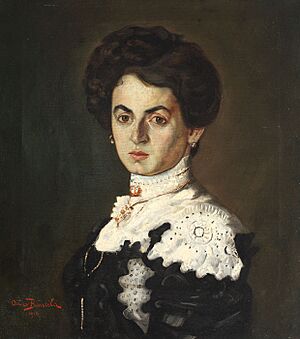Sofia Nădejde facts for kids
Sofia Nădejde (born Sofia Băncilă; September 14, 1856 – June 11, 1946) was a famous Romanian writer, journalist, and activist. She worked hard for women's rights and was also a socialist.
Contents
Early Life and Education
Sofia Nădejde was born in Botoșani, a city in Romania. Her father, Vasile Băncilă-Gheorghiu, was a merchant, and her mother was Pulheria. She was the sister of the well-known painter Octav Băncilă. Sofia went to primary school and a girls' boarding school in her hometown. She finished her high school exams in Iași.
Becoming a Journalist and Activist
In Iași, Sofia joined a group of people who believed in socialism. She started writing many articles to support women's social and political rights. In 1893, she became the leader of a magazine called Evenimentul literar. Her writings appeared in many newspapers and magazines, including Femeia română, Contemporanul, and Adevărul.
Sofia was part of a special group called the Contemporanul circle. Here, she worked with other important thinkers like Constantin Mille. Her articles often talked about:
- How families changed over time.
- The role of women in society.
- Wrong ideas about women's education.
- Women's work in the countryside and in factories.
She knew a lot about important thinkers from Europe, like John Stuart Mill and Charles Darwin.
Fighting for Women's Minds
Sofia Nădejde strongly disagreed with the idea that women's brains were too small for them to be smart or involved in politics. She used the newest scientific facts to show that women's brains were actually bigger in proportion to their bodies than men's. She had a big debate with Titu Maiorescu, another important Romanian writer, about this.
After this, Sofia focused on other reasons why women might seem less advanced. She pointed to things like:
- The way society was set up.
- Old-fashioned ideas and unfair rules.
- Not enough education for girls.
She used ideas from John Stuart Mill's book, The Subjection of Women, to ask for equal political and civil rights for women.
Working for Change
In the early 1880s, Sofia brought women together from different groups. They worked to raise money to help women get an education and find jobs.
Changing Political Ideas
Around 1886, Sofia became interested in Marxism. This is a way of thinking that looks at how society is divided by wealth. She believed that women's problems were caused by capitalism and private ownership.
However, by the mid-1890s, her ideas changed again. She started to like democratic liberalism, especially the ideas of Poporanism. This movement believed in helping the common people, especially farmers. She wrote for their magazine, Evenimentul literar.
In 1899, Sofia and her husband left the socialist movement. She felt that socialism would not work well in Romania, which was mostly a farming country. After this, she became less interested in politics and focused more on writing stories and plays.
Literary Works
Sofia Nădejde's first story, Două mame (Two Mothers), was published in Contemporanul in 1884. Her first book, a collection of short stories called Nuvele, came out in 1893.
She wrote many different types of books, including:
- Stories and sketches: Din chinurile vieții. Fiecare la rândul său (1895).
- Tales: Din lume pentru lume – Povestiri din popor (1909).
- Novels: Patimi (1903), Robia banului (1906), Părinți și copii (1907).
- Plays: O iubire la țară (1895), Fără noroc (1898), Ghica Vodă, domnul Moldovei (1899).
Sofia also translated many books from other languages into Romanian. She translated works by famous writers like Jules Verne, Henryk Sienkiewicz, and Charles Dickens.
Themes in Her Writing
In her stories, Sofia Nădejde often wrote about the same ideas she talked about in her journalism. She believed in "art with tendency," which means art that tries to teach a lesson or change society.
The main topic in her books was the unfair treatment of women. Her novels showed a strong belief in feminism, which is the idea that women should have equal rights and opportunities as men.
Before World War I, she also wrote articles about how women could succeed in modern society and the economy. In 1918, she helped start a group to fight for women's civil and political rights. In the 1930s, when some countries were becoming less democratic, she spoke up for democracy and human rights.
Later Life
After her husband died in 1928, Sofia Nădejde moved in with her daughter, Amelia. She lived on a small pension, which is like a retirement payment, from the Romanian Writers' Society. Sofia Nădejde passed away in her daughter's home in Bucharest in 1946.
 | Laphonza Butler |
 | Daisy Bates |
 | Elizabeth Piper Ensley |


